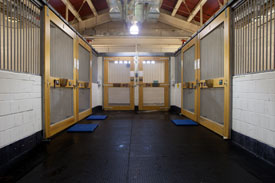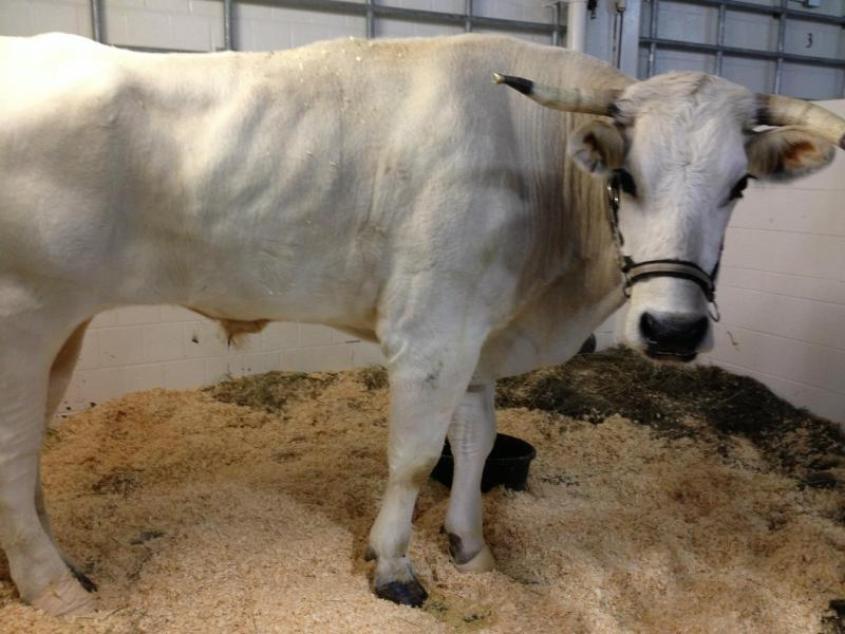 Your scheduled visit to the Cardiology Service at the Cornell University Hospital for Animals begins when you pull up to the circular driveway in front of the equine hospital. Please park your vehicle in the driveway, come into the reception area and check in at the front desk. After a small amount of paperwork, our licensed veterinary technician will help you unload and walk your animal to its assigned stall.
Your scheduled visit to the Cardiology Service at the Cornell University Hospital for Animals begins when you pull up to the circular driveway in front of the equine hospital. Please park your vehicle in the driveway, come into the reception area and check in at the front desk. After a small amount of paperwork, our licensed veterinary technician will help you unload and walk your animal to its assigned stall.
Often times, you may leave your vehicle and trailer right in the driveway but, if the lot is full, the receptionist will provide you with a parking pass and directions to nearby longer-term parking where overnight parking for trucks and trailers is also available.
After your vehicle is parked, a senior veterinarian, veterinary resident ask you questions about the animal's past medical, surgical, travel and vaccination history and current health. They will work together to conduct an examination of your animal. Students observe and participate in this examination, which is invaluable to their education and development. We appreciate your patience and understanding in allowing these future veterinarians to interact with you and your animal.
After the physical examination, our veterinarians will discuss their findings and treatment options, including cost. Together, you will develop plan for further diagnosis and treatment of your animal.
In most cases, you will be asked to leave your animal in the care of the student after this initial examination so that we may begin appropriate diagnostic testing, which commonly includes echocardiography, thoracic x-rays and electrocardiography. Your animal will also be assigned to an internal medicine veterinarian, who assist in managing their medical care and monitoring them during their stay.
Given our busy schedule and collaboration with other services in the care of your animal, you will most likely be asked to return in the afternoon to discuss our findings and recommendations . Please understand that our primary concern is the well being of your animal, and that although we will always strive to minimize the duration of your stay, we do not wish to compromise patient care. When you return, you will meet with the cardiologist or cardiology resident and the student working with your animal to discuss their findings and therapeutic recommendations.
In many cases, therapy will be in the form of medication that you can administer at home. In some cases, your animal may require hospitalization for supportive care or diagnostics. In the event that your animal requires an elective interventional procedure, the rationale, logistics, and risks associated with the procedure will be discussed at this time, and the procedure can often be scheduled either at the time of discharge or within 24 hours of discharge.
Before leaving the hospital, you will receive a copy of the cardiology report, which outlines the findings and recommendations for management of your animal’s case. Your referring veterinarian will also receive a copy of this report via mail. You will also receive a copy of discharge instructions, which outlines our findings and recommendations. We will strive to make sure that we have answered any and all questions that you may have prior to your departure.




 Your scheduled visit to the Cardiology Service at the Cornell University Hospital for Animals begins when you pull up to the circular driveway in front of the equine hospital. Please park your vehicle in the driveway, come into the reception area and check in at the front desk. After a small amount of paperwork, our licensed veterinary technician will help you unload and walk your animal to its assigned stall.
Your scheduled visit to the Cardiology Service at the Cornell University Hospital for Animals begins when you pull up to the circular driveway in front of the equine hospital. Please park your vehicle in the driveway, come into the reception area and check in at the front desk. After a small amount of paperwork, our licensed veterinary technician will help you unload and walk your animal to its assigned stall.